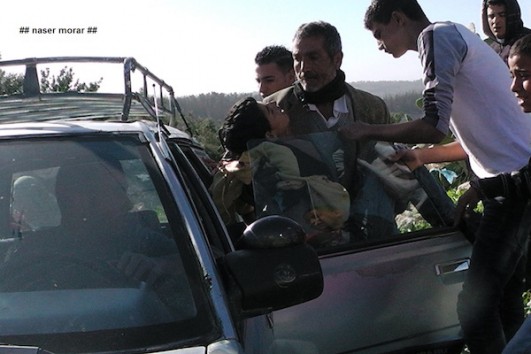Israeli soldiers shot 16-year-old Samir Awad eight times in the back, killing him. After a two-year delay, they were finally indicted. Now, five years after the killing, the prosecution is dropping the charges against them.

Indictments against two former Israeli soldiers charged with killing an unarmed Palestinian teenager will be dropped, the state prosecutor announced Monday.
The two former soldiers, whose names are under gag order, had been charged for the “reckless and negligent use of a firearm” that killed 16-year-old Samir Awad near the village of Budrus in 2013. Awad was shot in the back eight times by soldiers who had been lying in ambush near a hole in Israel’s separation barrier. He was not armed, nor did he pose a threat to anyone. He was running away when he was killed.
The army claimed Awad was attempting to damage part of the separation barrier when the soldiers opened fire.
The case has been ongoing since 2015, when Israeli authorities — after a more than two-year delay — finally indicted the two soldiers.
Why, after three years of legal proceedings, did the prosecutor decide to drop the charges?
During a hearing in the Ramle Magistrate’s Court in early May, the prosecutor admitted the case against the soldiers had been “badly damaged.” The defense had argued that prosecuting the two soldiers for illegally killing Samir would constitute “selective enforcement” of the law. To prove their point, they demanded that the state reveal statistical data regarding criminal investigations and prosecutions of other soldiers who have killed Palestinians, as well as the case materials themselves. Israeli authorities did not want to provide those files, on which the outcome of the case likely depended.
Israel’s civilian and military justice systems rarely prosecute Israeli soldiers for killing Palestinian civilians. According to Israeli human rights group Yesh Din, between 2011 and 2016, just 3.4 percent of investigations into attacks on Palestinians opened by the army’s Criminal Investigation’s Department ended in indictments.
“The prosecutor’s announcement of the cancellation of the indictments against the two soldiers involved in the killing of the youth Samir Awad constitutes another example of the impunity enjoyed by soldiers who wound Palestinians,” Yesh Din said in a statement issued in response.
“The bottom line is that the military system protects soldiers who violate the law and wound Palestinians, while leaving Palestinians defenseless,” the statement continued.
It took Israeli authorities more than two years to indict the soldiers who shot Samir — only after Ahmad Awad, Samir’s father, sued, with the help of Israeli human rights NGO B’Tselem, to force the Military Advocate General to either file an indictment or close the investigation.
By the time authorities finally reached a decision to prosecute, the two soldiers were no longer under the jurisdiction of the military justice system. They were being tried for a crime they committed during their military service by civilian prosecutors in a civilian court unequipped to adjudicate military matters. After the prosecution’s announcement, they will walk free.


